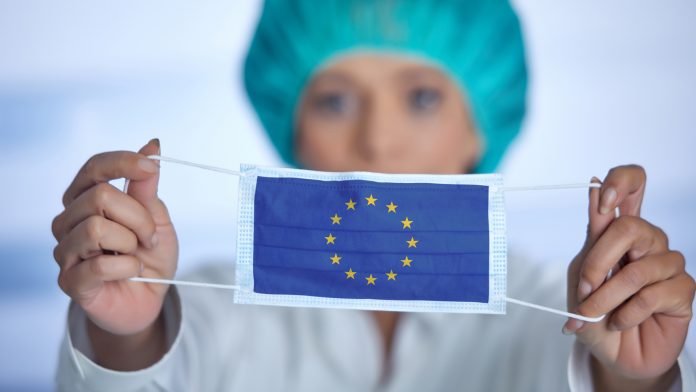MEP Ros Sempere spoke to The Innovation Platform’s Clifford Holt about how the European Parliament will continue to play a key role in Europe’s transition to a more sustainable future by including a clear focus on citizens and consumers.
The Inter-Institutional Group ‘SDGs for Well-Being and Consumers’ Protection’, which is being promoted by Cittadinanzattiva/Active Citizenship Network (ACN), the European Consumers Union (ECU), and the Italian Alliance for Sustainable Development (ASviS) and supported by 47 associations from 24 European countries, is designed to promote consumers’ rights and support the European Commission’s priorities as outlined in the European Green Deal.
With many of the priority policy areas for the EU now being further highlighted by the impacts of the COVID-19 pandemic, Europe’s institutions need to act to ensure both Europe’s sustainable future and, moreover, to ensure that the voice of the Union’s citizens are heard.
Working in collaboration with Cittadinanzattiva/Active Citizenship Network (ACN), The Innovation Platform’s International Editor, Clifford Holt, spoke to Spanish MEP Ros Sempere about the role that the European Parliament can play.
The transition to a sustainable Europe has to be based on the commitment that ‘no one is left behind’, as stated by the European Commission’s President Ursula von der Leyen, and that everyone has to be involved in the achievement of this goal. To do so, social concerns should be addressed in full synergy with environmental and economic ones. In this context of a generalised crisis caused by the pandemic, do you think that enough is being done at European level with the ‘Next Generation EU’?
Involving European citizens and consumers in achieving the UN’s SDGs is an important issue. There are three main objectives to the Next Generation EU programme:
- Achieving a climate transition;
- Achieving an environmental transition; and
- Achieving a digital transition.
It is important that Next Generation EU starts to function as quickly as possible, as this will be crucial to enabling Europe to successfully emerge from the COVID-19 pandemic. It is also important that European SMEs are quickly able to access some of the projects that are going to be funded by this programme and indeed, that consumers are also able to benefit. If we are able to increase the co-ordination and links between enterprise and consumers, then that will be a good starting point.
How are such issues being addressed in your country, Spain?
In Spain, the government has set 10 main political focuses. For example, one is the Urban Agenda, another focuses on gender equality, and another on the ecological transition. Projects proposed by the regions, municipalities and institutions must be in one of these 10 areas. Once the central government has received the proposals from the administrations, regions, cities and other institutions. They will choose which are to be put forward to the European Commission for funding.
The 10 areas that have been selected are interesting because they cover almost all of our country’s needs as we move forwards and as we work to change our model. The main objective is not to simply distribute money that will enable us to go on doing things in the same way as we were before the pandemic. On the contrary, we will only be financing those projects which will enable us to evolve, changing our production and consumption models so that we are able to play an integral part in the climate, environmental and digital transitions, ultimately improving our social cohesion.
European citizens’ role in reaching the ambitions of the European Green Deal and the SDGs is key. The Inter-Institutional Group ‘SDGs for Well-Being and Consumers’ Protection’, which you support, represents civil society’s desire to contribute to the SDGs and the Green Deal, aiming to discuss and raise awareness on how the individual can give her/his contribution. What prompted you to support this initiative and how do you think it can support the dialogue between the European institutions and civil society at the European level?
It is important for European institutions to be involved in such a dialogue because the ‘New Deal for Consumers’ initiative and the European Green Deal must be linked. The role of the European institutions will be extremely important in achieving the future transition, and this is particularly true of the European Parliament. The European Parliament is the only one of the three main institutions (the European Commission, the European Council, and the European Parliament) that effectively represents all of Europe’s citizens. The Council represents the European governments, and the Commission is the political arm of the EU; the European Parliament represents citizens because we are elected by them.
In all of our political documents, reports, resolutions and so on, we try to ensure that citizens are involved, and we also work to provide outreach materials to ensure that the right information reaches EU citizens. This is important because the change that we need to see will start both bottom-up (from citizens) and top-down (from the European institutions).
As an elected member of the European Parliament, I believe that it is important to engage and support initiatives such as the ‘SDGs for Well-Being and Consumers’ Protection’, as well as to attend and take part in conferences, webinars, and many other kinds of action in order to help facilitate this.
The active participation of European citizens should perhaps be at the base of the transition. As such, do you think that the Inter-Institutional Group ‘SDGs for Well-Being and Consumers’ Protection’ can be considered as an example of the ‘thematic Citizens’ agoras’ that the European Parliament has committed to promote?
The Conference on the Future of Europe represents an important point in the process towards the transition. It is not too much to say that we are running out of time to ensure that the future of the European Union is the right one.
When we look back to the last financial crisis, which we experienced in 2008, it is clear that the European Union did not respond as well as its citizens expected (or deserved). Now, there are several worrying movements in Europe – populism, extremism, and anti-Europe sentiments. For instance, the latter of which has resulted in the United Kingdom leaving the EU. We were therefore in a very critical time even before the COVID-19 pandemic began. Now, as we begin to see hopeful signs that we may be beating the coronavirus, we had to decide whether we wanted to strengthen the EU or dissolve it and, fortunately, we decided to strengthen the bloc – both at the political level but also by empowering our citizens and responding to them in a more effective way.

In the current climate, the European Union has, I believe, responded well to the challenges that have arisen as a result of the coronavirus pandemic, which has provided us with an opportunity to rethink how the EU can evolve into a more cohesive union moving forwards.
The Conference on the Future of Europe should therefore be seen as a starting point on the foundations of which we are able to rebuild our institutional architecture. We have now realised that the EU is something that offers value and is certainly worth saving, and so now is the time to act to ensure that this is achieved. We must understand, and perhaps COVID-19 is teaching us that lesson, that some challenges are only surmountable if we work together.
The promoters of the Inter-institutional Group strongly believe that citizen and consumer empowerment should be the pillar of the transition towards a more inclusive and sustainable Europe, in line with the ‘New Consumer Agenda’, presented by the Commission in November, which will allow consumers to play an active role in the green and digital transitions. In this regard, would you say that a greater commitment on the part of the relevant European institutions is necessary to stimulate greater dialogue and collaboration between companies and consumers?
Yes, I believe that this inter-institutional group is a great initiative because there is no doubt that we all have to work together to achieve our objectives. Of course, the protection of consumer rights will continue to be a main objective, but we must also see a paradigm shift in terms of consumer attitudes, and that will only become effective if all stakeholders co-operate. This initiative is a very important example of that.
In Spain, we have an Active Citizenship Network that works with the national institutions. That has been functioning well over the past few years and is perhaps a model that can be built on and expanded so that it works for the whole of the EU, bringing citizens together with the Commission, Council and Parliament.
The transition to a sustainable and efficient economy requires radical changes in the consumption habits of our society and in the production models of our economy. What is the European Parliament doing in this regard and what do you think still needs to be done in terms of current legislature?
While I am not in all of the Parliamentary Committees that are active in these areas, it is clear that the European Parliament has been working for some time to ensure that consumer rights are protected (as evinced in the numerous Directives, which have been approved by the European Parliament and Council and implemented by the European Commission), on the one hand, while on the other hand, we are also trying to develop as many Resolutions and Directives as possible to help change consumption habits.
For example, a few months ago we adopted a Resolution to try to reduce the number of different chargers required for electronic devices in the EU – currently, you may need one for your mobile phone, and another different one for a camera, and another still for a tablet, and so on. This is just one example of the way in which the European Parliament is working, but there are also many others. The European Parliament is the main institution involved in this Resolution and indeed, it is the Parliament that always goes further down such routes than either the Commission or the Council. To take European climate law as an example: the European Commission wanted emissions to be reduced to 40% of pre-industrial levels by 2030, but the Parliament wanted to increase this reduction to 60%. Finally, through the trilogues between the European Commission, Council, and Parliament, we were able to agree on a reduction of 55%, but that target would not have been reached if the Parliament had not originally put forward an even higher figure.
The European Parliament is thus the best institution to try to promote the changes that we need in terms of consumer behaviour, and we will hopefully continue to be as effective as we have been elsewhere.
Marcos Ros Sempere
Member of European Parliament
marcos.ros@europarl.europa.eu
Tweet @mrossemp
www.europarl.europa.eu/meps/en/204413/MARCOS_ROS+SEMPERE/home
Please note, this article will also appear in the fifth edition of our quarterly publication.





